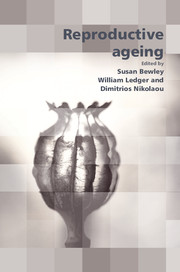Book contents
- Frontmatter
- Contents
- Participants
- Declarations of personal interest
- Preface
- SECTION 1 BACKGROUND TO AGEING AND DEMOGRAPHICS
- SECTION 2 BASIC SCIENCE OF REPRODUCTIVE AGEING
- SECTION 3 PREGNANCY: THE AGEING MOTHER AND MEDICAL NEEDS
- SECTION 4 THE OUTCOMES: CHILDREN AND MOTHERS
- SECTION 5 FUTURE FERTILITY INSURANCE: SCREENING, CRYOPRESERVATION OR EGG DONORS?
- SECTION 6 SEX BEYOND AND AFTER FERTILITY
- SECTION 7 REPRODUCTIVE AGEING AND THE RCOG: AN INTERNATIONAL COLLEGE
- 26 What should be the RCOG's relationship with older women?
- 27 Reproductive ageing and the RCOG
- SECTION 8 FERTILITY TREATMENT: SCIENCE AND REALITY – THE NHS AND THE MARKET
- SECTION 9 THE FUTURE: DREAMS AND WAKING UP
- SECTION 10 CONSENSUS VIEWS
- Index
26 - What should be the RCOG's relationship with older women?
from SECTION 7 - REPRODUCTIVE AGEING AND THE RCOG: AN INTERNATIONAL COLLEGE
Published online by Cambridge University Press: 05 February 2014
- Frontmatter
- Contents
- Participants
- Declarations of personal interest
- Preface
- SECTION 1 BACKGROUND TO AGEING AND DEMOGRAPHICS
- SECTION 2 BASIC SCIENCE OF REPRODUCTIVE AGEING
- SECTION 3 PREGNANCY: THE AGEING MOTHER AND MEDICAL NEEDS
- SECTION 4 THE OUTCOMES: CHILDREN AND MOTHERS
- SECTION 5 FUTURE FERTILITY INSURANCE: SCREENING, CRYOPRESERVATION OR EGG DONORS?
- SECTION 6 SEX BEYOND AND AFTER FERTILITY
- SECTION 7 REPRODUCTIVE AGEING AND THE RCOG: AN INTERNATIONAL COLLEGE
- 26 What should be the RCOG's relationship with older women?
- 27 Reproductive ageing and the RCOG
- SECTION 8 FERTILITY TREATMENT: SCIENCE AND REALITY – THE NHS AND THE MARKET
- SECTION 9 THE FUTURE: DREAMS AND WAKING UP
- SECTION 10 CONSENSUS VIEWS
- Index
Summary
Introduction
A ‘should’ question normally signals work for an ethicist but this ethicist's task is complicated by the normative dimension of all the chapters in this volume. Each author was asked to come up with three recommendations from their own subject area — ‘should’ statements deriving from the ‘is’ analysis that they present. If those prescriptions cover the relevant topics, what more is there for an ethicist to do?
I have had a personal interest in obstetricians' relationship with ‘older women’ since being classified as an ‘elderly primigravida’ at the superannuated age of 26 years. Apart from that, however, what original contribution can I make? The convenors of the 56th RCOG Study Group gave me plentiful suggestions — perhaps a little too plentiful:
How should the RCOG approach its constituencies, medical ethics, regulation and its relationship to government and the rest of the medical profession, i.e. the NHS and the market, vested interests, individuals or consumers, families, the unborn, doctors, drug companies, surrogacy, the unborn, trafficking, global adoption, law, research?
I have to admit this was just too much for me. Instead, I want to argue for what may seem a self-evidently simple point. The RCOG describes its mission as ‘setting standards to improve women's health’ — presumably all women. In the 6 years that I have served on the RCOG Ethics Committee, however, we have almost always been concerned with that minority of the female population who are of reproductive age.
Keywords
- Type
- Chapter
- Information
- Reproductive Ageing , pp. 277 - 286Publisher: Cambridge University PressPrint publication year: 2009



